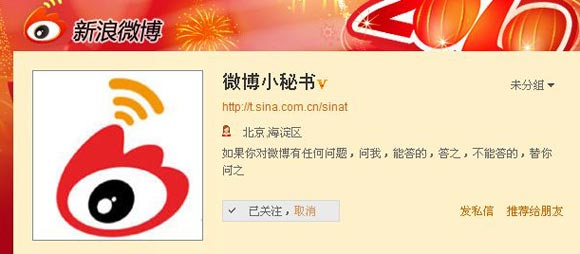| Videos | • Latest |
|
• Feature | • Sports | • Your Videos |
Weibo helps express citizens' views

 0 Comment(s)
0 Comment(s) Print
Print E-mail CNTV, March 5, 2012
E-mail CNTV, March 5, 2012
Microblog, or Weibo has definitely become a platform for many Chinese to voice their concerns. And this has gone all the way to the top, with 2011 named "The Year of Government Microblogging." CCTV reporter Hou Na tells us how Weibo has transformed the information channels between netizens and the government.
 |
|
[File photo] |
"Our train bumped into something. Our carriage has fallen onto its side. Children are screaming. Come help us please! Come fast!" This is the first message sent from a high-speed train that crashed on July 23rd last year in China's Zhejiang province.
Not only a cry for help, it saved lives. It also triggered a wave of unprecedented "citizen journalism" on China's micro-blogs. Within hours, the message had been reposted over one-hundred-thousand times.
As with traditional media, Weibo functions as a mirror on society, sparking debates and enlightening discussions.
But what's different about the micro-blogging site is that anyone - not just journalists - can take a photo, record a video clip or write a quick note about what is happening around them.
"The first thing I do in the morning is to check my Weibo. I say "Hi" to my friends on Weibo."
“I can fully accept this new Weibo lifestyle. Almost everyone has Weibo now."
Clearly, Weibo enables millions of Chinese to become "citizen journalists," opening them up to fresh news and views on their community, country and world.
This has led to many micro-bloggers keeping a closer eye on the authorities. In response, the government is also using Weibo as a tool to respond to citizens' queries.
A great part of Beijing district government bureaux have now opened Weibo accounts, attracting more than four million followers. And micro-bloggers have already left thousands of messages, urging the government to solve problems they consider urgent.
Wang Hui, general director of Beijing Information Office, said, "Weibo has created a platform for government officials to better understand what citizens are thinking and what they really need. This bottom-to-top information transmission channel is innovative and will become a new trend for government officials to provide better services to the public."
But that is easier said than done. This recent Weibo case has sparked much online interest. It is a complaint about the treatment a cancer patient received in hospital.
Though the Secretary of the CPC Shanghai Committee replied through Weibo to the son the of the cancer patient, Xiao Qin, many netizens remain concerned.
So for internet communities, Government Weibo, as a bridge between the leadership and the public, means much more than just 140-character messages.






Go to Forum >>0 Comment(s)